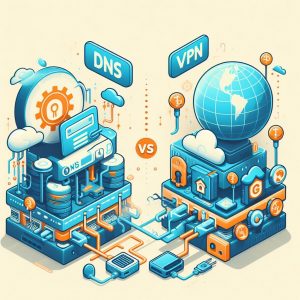Introduction
When accessing the internet, technologies like Domain Name System (DNS), Virtual Private Networks (VPN), and increasingly Smart DNS play a pivotal yet often overlooked role in not just enabling connectivity but also personal security and privacy.
How each protocol handles routing data can unlock content, obscure identity and location, or expose traffic to risks. Given rapidly escalating cybercrime and surveillance, understanding key differences empowers safer online experiences. This guide explores essential services, protections, use cases and limitations of DNS, Smart DNS and VPNs for more informed usage tailored to specific needs.
DNS (Domain Name System)
The Domain Name System (DNS) comprises the backbone directing all web traffic. Whenever you type a URL like example.com into a browser, DNS translates the domain name into a machine-readable IP address to route the request.
Domain Name Translation
A DNS query first checks locally then queries a hierarchy of servers to match a domain against published IP addresses maintained in global registries. Top level DNS servers communication with lower level name servers until identifying the correct corresponding IP to return. The browser then connects using this address.
Think of DNS like a giant phonebook matching friendly domain names people can remember to direct dial number IPs computers need to route communications. DNS makes reaching intended destinations possible.
No Inherent Security
Critically, the DNS protocol itself does not provide any encryption or security for data in transit between clients and servers. Traffic handled strictly through DNS remains visible to internet service providers (ISPs) and surveillance networks.
While essential for basic internet functionality, on its own DNS does not hide user identity, location or protect the contents of data sent between devices using translated IPs. Additional protections like VPNs or Tor are necessary to add security layers.

Smart DNS
Smart DNS offers a middle ground between bare DNS and robust VPN coverage by intelligently rerouting only select, sensitive traffic to secure destinations while leaving general traffic untouched.
Selective Rerouting
Like DNS, Smart DNS still translates domain names to IP addresses for site access. However, Smart DNS proxies reroute requests for specific sites and services to alternate IP addresses typically in different geographic regions to unlock content otherwise unavailable in particular locations.
For example, by mapping requests for US Netflix to route through US-based proxy IPs, Smart DNS allows bypassing geo-blocks to view titles restricted only to American Netflix subscribers as if accessing from America.
Yet for non-sensitive sites, regular unprotected DNS lookups proceed as normal without proxies to maintain performance. Think of Smart DNS as context-aware DNS providing surgical redirection only when necessary to defeat geo-fencing.
Privacy Tradeoffs
Due to enabling proxy rerouting for specific sites, Smart DNS provides a measure of obfuscation by masking regional identity solely when accessing geo-restricted services but no actual data encryption protecting full traffic like a VPN. General internet browsing remains as vulnerable as plain DNS lacking encryption safeguards.
VPN (Virtual Private Network)
Unlike DNS and Smart DNS focused strictly on mapping domain names to IP addresses, Virtual Private Networks (VPN) ensure full data security by handling all aspects of internet routing through encrypted tunnels.
Encrypted Data Tunneling
After connecting to a VPN server, every packet transmitted takes an encrypted pathway routing through the intermediary server before exiting to public networks. This fully masks the client IP address and encrypts data end-to-end preventing snooping.
Here’s how VPN data tunneling maintains privacy:
- Encryption applied to all data packets before exiting the local network prevents content inspection even by internet providers.
- Routing through intermediary VPN servers hides the true originating IP address and location.
- Emerging via new VPN IP address matched to server location obscures identity and region.
This makes VPN usage largely anonymous with all data shielded from prying eyes up until the VPN endpoint before contents get decrypted for public internet transit as usual.

Comparison Table
| Category | DNS | Smart DNS | VPN |
| Primary Function | Translates domains to IP addresses | Selectively proxies geo-restricted traffic requests to alternate regions | Encrypts and tunnels all traffic through VPN provider’s server network |
| Privacy | None – traffic exposed | Limited to proxied services, general traffic still visible | Full encryption hides entire online footprint |
| Security | No encryption mechanisms | No encryption, some geo-restriction evasion | Encrypts data making interception difficult |
| Speed Impacts | Minimal slowdown | Some delay due to proxy redirection | Moderate speed reduction depending on protocols and encryption strength |
Use Cases
Now that we’ve explored the critical handling differences between regular DNS, Smart DNS and full VPN services, when should each be applied based on specific use case priorities?
Standard DNS
Universal DNS remains necessary for literally reaching any site or service online by mapping readable names to machine IPs. Without this fundamental layer, internet functionality breaks.
However lack of privacy makes bare DNS inappropriate for shielding sensitive traffic like financial transactions or medical communications against providers or snoops. It should be relied on exclusively only for general public browsing lacking confidentiality concerns.
Smart DNS
Unlock geo-blocked content from streaming platforms like US Netflix or BBC iPlayer abroad by redirecting DNS traffic through proxied endpoints in target countries. This provides targeted unblocking without compromises in speed or disruption of general browsing.
But for protecting all traffic from ISP monitoring, Smart DNS remains inadequate. Instead employ alongside VPN services to benefit from regional evasion only where necessary while VPN encrypts everything else universally.
VPN
When conducting any private communications or browsing where contents must stay obscured from internet providers, advertisers, cyber criminals and other malicious actors, connect via VPN conduits first to hide originating address and encrypt data end-to-end.
This shields identity and guards sensitive information traversing public networks while still securely reaching intended endpoints. Just beware speed tradeoffs inherent to encryption.
For maximum security and privacy, deploy VPN universally while toggling Smart DNS selectively only when accessing geo-fenced platforms regionally unavailable. Together they provide identity protection while opening restricted libraries. Falls back on regular DNS when no special handling required.

Conclusion
As the internet becomes exponentially more hostile toward privacy through unprecedented surveillance coupled with cyber attacks, every layer in the routing flow of traffic from domains to IPs presents opportunity for our data and identity to stay protected rather than exposed to those threats.
Technologies like DNS, Smart DNS and VPN serve unique purposes, provide varying cover and carry speed consequences when employed. By comprehending key offerings around security, geo-restriction evasion and encryption strengths of each solution and aligning usage against priorities for safeguarding sensitive communications versus more casual public browsing, we unlock safer internet experiences resistant against growing digital intrusions.